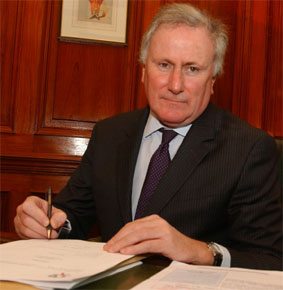Judicial Lectures: Lord Kerr on the relationship between Strasbourg and Domestic Law
22 Sunday Nov 2009
UKSC Blog News Articles, Features
Share it
 On Friday 20 November 2009 Supreme Court Justice Lord Kerr gave the 13th John M Kelly Memorial lecture at the University College Dublin School of Law. The lecture was entitled “The Conversation between the European Court of Human Rights and National Courts: Dialogue or Dictation”.
On Friday 20 November 2009 Supreme Court Justice Lord Kerr gave the 13th John M Kelly Memorial lecture at the University College Dublin School of Law. The lecture was entitled “The Conversation between the European Court of Human Rights and National Courts: Dialogue or Dictation”.
The text of the lecture has not yet been published but the impressive Human Rights in Ireland blog has a report here. According to this report, Lord Kerr dealt with the implications for the domestic courts of decisions of the European Court of Human Rights (“the ECtHR”) that appeared to lay down a universal rule for the member states of the Council of Europe but where implementation of that rule caused substantial practical difficulties in the domestic state.
Lord Kerr identified a number of reasons why any conception of Convention caselaw as ‘binding’. First, where there is a written constitution there may be tensions between constitutional supremacy and Convention case law. Second, because of the ECtHR’s commitment to dynamic or evolutive interpretation of the Convention there is no strict concept of precedent in the Strasbourg court, which may make things like the contemporaneousness of a judgment important in considering whether it ought to be binding or not; Third, where a domestic court considers itself bound to follow a Strasbourg decision serious practical difficulties may flow from the implementation of that decision.
He discussed the decision of the House of Lords in Secretary of State for the Home Department v AF & Anor [2009] UKHL 28, in which the Lords held that people have the right to know the information used against them to impose control orders, so that they can effectively challenge those orders. A number of the members of the Judicial Committee regarded that result as being mandated by the then recent decision of the Grand Chamber A v United Kingdom. Lord Kerr said it was important this decision was extremely current and exactly on point. He said that to have refused to follow it would have been “unseemly and discordant”. But he suggested that it is clear from the speeches in the case that the members of the House of Lords were trying to communicate to the Strasbourg Court the difficulties in practical terms that laying down such a universal rule regarding disclosure might have in the domestic jurisdictions. Lord Kerr was clear in his support for the European Court of Human Rights as an institution, noting that without it we would be deprived of “an invaluable and irreplacable strain of jurisprudence”. While there were some difficulties with the Court he felt that there were ways in which such difficulties might be overcome or at least effectively communicated. In this respect, Lord Kerr said that where difficulties arise national courts ought to clearly communicate them to the Strasbourg Court. To do this, common law superior courts need to become very familiar with the civil law systems in order to be able to point out situations in which a universal rule handed down by the ECtHR might not be suitable within a common law context. He went on to note that the exchange of views and ideas should not be limited to the adjudicatory process.
In response to a question Lord Kerr noted that the writing of a judgment provides somewhat limited opportunity for such communication and suggested that structured and effective systems of court visits and judicial networks ought to be encouraged.
This is an interesting and thoughtful contribution to a topic which will often be of critical importance to decisions of the Supreme Court (for example, in the forthcoming decision in R v Horncastle which involved a direct clash between Strasbourg and the domestic courts). We have recently blogged a speech by Lady Justice Arden on a closely related topic. We will let readers know when a full copy of Lord Kerr’s speech is available.
As a footnote, we draw attention to the discussion of the relationship between Strasbourg and domestic case law by another Justice of the Supreme Court. This was by Baroness Hale in last year’s JUSTICE Tom Sargant Memorial Lecture entitled “Law Lords at the Margin: Who defines Convention rights?”



2 comments